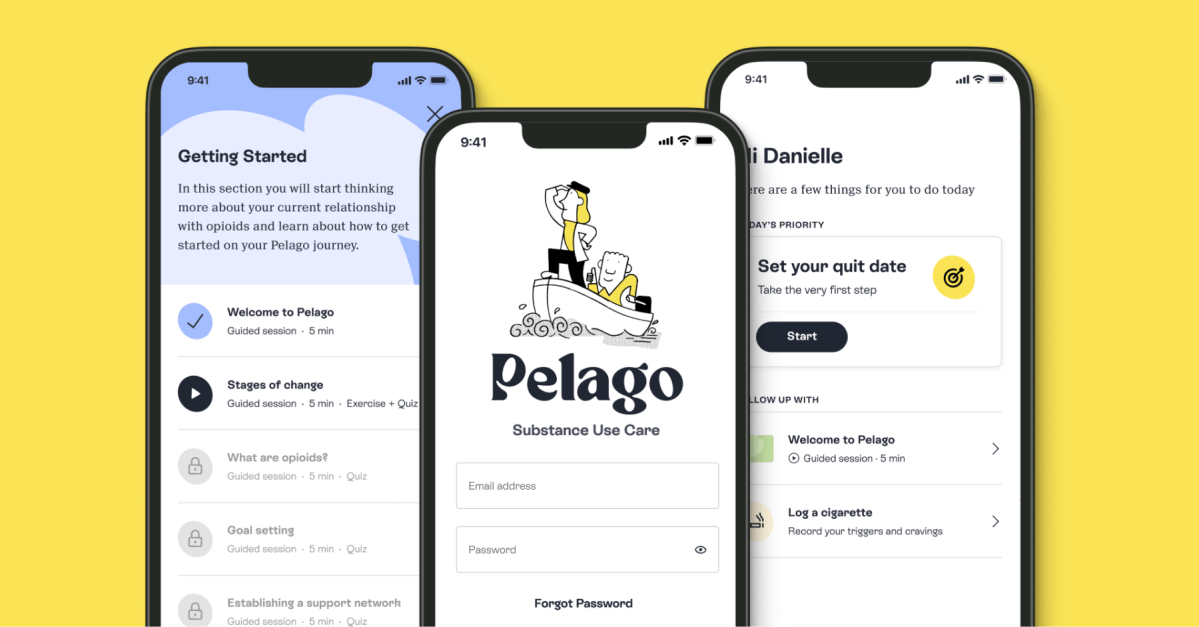Pelago Health, a telehealth company backed by Y Combinator, has raised $58 million in a Series C round of funding. This brings their total funding to $151 million since being established in 2017. The latest round of funding comes two and a half years after their Series B of $64 million, which took place during the COVID pandemic.
According to Yusuf Sherwani, co-founder and CEO of Pelago, the company plans to use the funds to expand their user base, further their clinical research efforts, and develop new products. Recently, the company expanded their virtual therapy services to include adolescents and extended their medication-assisted treatment for substance use disorders to all 50 states for both adults and teens.
The company has seen exponential growth since their Series B, with an 11x increase in revenue and 100% client retention. However, they did not disclose their revenue baseline. Additionally, their full-time staff has tripled from 50 in 2021 to 150, showcasing their rapid expansion.
Pelago’s co-founders, including Sherwani, Maroof Ahmed (COO), and Sarim Siddiqui (head of product), all met in medical school and were motivated to start the company after witnessing the devastating effects of addiction. They recognized that addiction and substance abuse require personalized and nuanced approaches, rather than a one-size-fits-all solution. By combining their medical knowledge with advances in technology and the growing acceptance of telehealth solutions, they created Pelago as a platform for individuals seeking treatment for addiction.
It’s worth noting that Pelago does not directly sell their services to consumers. Instead, they partner with employers and healthcare benefit providers who offer it as a service to their employees or health plan members seeking treatment for themselves or their families. Pelago’s current focus is on substance abuse, specifically alcohol, tobacco, and opioids.
The company’s remote CBT program consists of a team of physicians, nurses, counselors, and coaches, all led by a physician. Each user is diagnosed and provided with a personalized care plan. Regular virtual sessions are conducted in the app with health coaches or licensed drug and alcohol counselors. The platform also offers in-app telehealth capabilities such as video and audio calling and a direct-to-therapist chat interface. Therapists can also request structured wellness checks for their members. Additionally, Pelago offers PelagoRx, a confidential prescription service for medication-assisted treatment (MAT).
Currently, Pelago has more than 100 enterprise clients in various industries, including mining, manufacturing, technology, construction, education, and healthcare. According to their website, they have over 750,000 registered users as of August 2023. In May 2018, TechCrunch reported that the company had around 300,000 registered users.
In an interview with TechCrunch, the company’s CEO explained that Pelago offers integrated substance use management for employers and health plan populations, with specialized treatment for tobacco, alcohol, and opioid use disorders, as well as support for adolescents.
Aside from the fact that medical approaches to addiction can be unpredictable, they can also be costly. According to a survey, 67% of working adults in the U.S. with an alcohol or illicit drug use disorder remain employed. However, treating substance use disorders for each individual enrolled in employer-sponsored insurance can cost upwards of $15,640 per year on average.
Last year, Pelago conducted an internal study which found that their service reduced medical claims by $9,367 annually per participant compared to a control group. Furthermore, the company’s CEO claims that their users are five times more likely to quit smoking within one year using the Pelago platform compared to other programs.
In addition to their virtual therapy interface, Pelago is also investing in incorporating more technology into their business. For example, they have introduced an AI-powered assistant, Pelago Chart, which helps clinical teams take notes more efficiently.
The Series C funding was led by Atomico, a previous backer who doubled down on their investment due to Pelago’s impressive growth. Other returning investors also participated, including Kinnevik AB, Octopus Ventures, and Y Combinator. New investors, including Eight Roads and GreyMatter Capital, also joined the round.
“Substance addiction and abuse exist on a spectrum, with every individual’s experience and situation needing nuanced approaches, but straightforward medicalized approaches are often not a silver bullet.” – Pelago co-founders
When it comes to addiction, there is no one-size-fits-all solution. Pelago Health recognizes this and has created a platform that caters to the individualized needs of each user, leveraging the power of technology and telehealth to provide effective treatment for tobacco, alcohol, and opioid addictions. With their recent funding, the company is poised to continue expanding their reach and impact on the fight against addiction.








